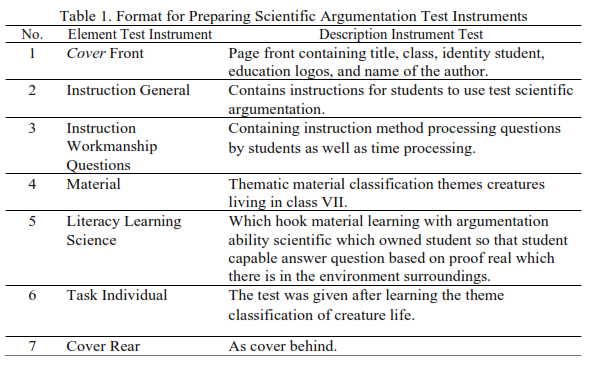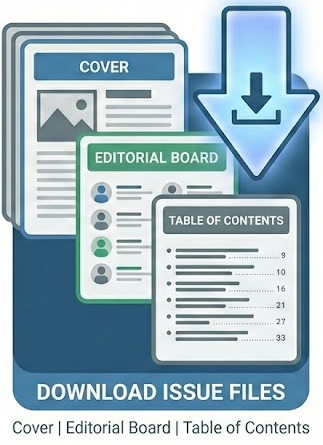Development of Scientific Argumentation Test Instruments for Students on the Classification of Living Creatures in Junior High School
DOI:
https://doi.org/10.30736/seaj.v6i2.1056Keywords:
Test instrument, Scientific argumentation, Classification of living thingsAbstract
Development of Scientific Argumentation Test Instruments for Students on the Classification of Living Creatures in Junior High School. Encouraging students to think and act like scientists is an important basis of the scientific approach to learning. Both students and scientists need arguments. This study uses a research and development (R&D) approach concerning the ADDIE model. The validation stage has been carried out by experts—linguists, material experts, and media experts—as well as one-on-one trials, small groups, and teacher practice. It can be concluded that the results of the expert validation as a whole.
Downloads
References
Azizah, N., & Syarifah. (2021). ADDIE Learning Design (Analysis, Design, Development, Implementation, and Evaluation) E-Learning on Islamic Cultural History Material. UHAMKA Islamic Education Journal, 12 (2), 109–120.
Bahri, S. (2012). Penggunaan Multiplerepresetasi Dan Argumetasi Ilmiah Dalam Pembelajaran Fisika. Jurnal Serambi Ilmu, 13(1), 46-50.
Cahyadi, RAH (2019). Development of Teaching Materials Based on the Addie Model. Halaqa: Islamic Education Journal, 3 (1), 35–42.
Denny Pratama, L., Bahauddin, A., & Lestari, W. (2019). Educational Games: Do they make learning more interesting? At-Ta'lim : Journal of Education, 5 (1), 39–50.
Eliyadi. (2013). Class VII Science Learning Media. Journal of Education.
Fachrurrazi, A. (2010). Utilization and Development of Information Technology-Based Media for Learning. Buana Pendidikan: Journal of the Faculty of Teacher Training and Education, 6 (11), 21–24.
Fitriani, Fauziah Harahap, and Binari Manurung. 2018. “Analisis Kemampuan Literasi Sains Biologi Siswa SMA Se-KabupatenAceh Tamiang, Aceh, Indonesia.” Prosiding Seminar Nasional Biologi Dan Pembelajarannya Universitas Negeri Medan
Hadisaputra. (2022). Strategy for Using Online Games in Educating Children. NANAEKE: Indonesian Journal of Early Childhood Education , 5 (1), 1–14.
Hamidah, Nur, and Sri Haryani. 2018. “Efektivitas Lembar Kerja Peserta Didik Berbasis Inkuiri Terbimbing Untuk Meningkatkan Hasil Belajar Siswa.” 12(2):2212–23.
Harahap, Abdul Rasyid, Ni Nyoman Sarmi, Besin Gaspar, Abdul Rasyid Harahap, Ni Nyoman Sarmi, and Besin Gaspar. 2022. “Indonesian Journal of Instructional Pengaruh Penerapan Team Teaching Dan Respon Siswa Terhadap Hasil Belajar Bahasa Indonesia.” 3
Haviz, M. (2016). Research and Development; Research in the field of education that is innovative, productive and meaningful. Ta'dib , 16 (1).
Hidayat, F., & Nizar, M. (2021). Addie Model (Analysis, Design, Development, Implementation and Evaluation) in Islamic Religious Education Learning. Journal of Islamic Religious Education Innovation (JIPAI) , 1 (1), 28–38.
Imania, Kuntum Annisa, and Siti Khusnul Bariah. 2019. “Rancangan Pengembangan Instrumen Penilaian Pembelajaran Berbasis Daring.” Jurnal Petik5(1):31–47. doi: 10.31980/jpetik.v5i1.445.
Ismawan, Fiqih, Puput Irfansyah, and Dwi Dani Apriyani. 2018. “Pengoptimalan Cloud Storage-Google Drive Sebagai Media Pembelajaran.” 01(01):61–70.
Khaerunnisa, K., Latri, L., & Lestari, R. (2022). Application of the Games-Based Learning Method to Increase Interest in Learning in Class VII Students. IF PGSD : Scientific Journal of Educational Sciences, 6 (3), 516–520.
Made Suastikarani, L. (2019). Classification of Living Things. Biology , 1 , 1–70.
Madrasah, V. I. I., Tsanawiyah Sahabat, and Cendikia Kota. 2021. “Pembelajaran Ipa Terpadu Terintegrasi Nilai-Nilai Islam Sebagai Solusi Untuk Meningkatkat Hasil Belajar Siswa Kelas Vii Madrasah Tsanawiyah Sahabat Cendikia Kota Ternate.” 12(2):11–20.
Magdalena, Ina, Hadana Nur Fauzi, and Raafiza Putri. 2020. “Pentingnya Evaluasi Dalam Pembelajaran Dan Akibat Memanipulasinya.” Jurnal Pendidikan Dan Sains2(2):244–57.
Magdalena, Ina, Ayu Wahyuni, Davina Dewi Hartana, and Universitas Muhammadiyah Tangerang. n.d. “Pengelolaan Pembelajaran Daring Yang Efektif Selama Pandemi Di Sdn 1 Tanah Tinggi.” 2:366–77.
Manajemen, Jurnal. 2013. “No Title.” 13(01):1–17
Nurmalasari, L., Taheri Akhbar, M., & Syaflin, SL (2022). Development of Animal and Plant Card Media (Tuhetu) in Class IV Science Learning at State Elementary Schools. Journal of Elementary Education Research , 5 (April), 1–8.
Rizalni, R.L., Trisnadoli, A., & Zul, MI (2019). Development of Mobile Educational Game on Living Creatures for Reptile Class for Middle School Students. National Journal of Informatics Engineering Education (JANAPATI) , 8 (2), 87.
Sari, NP (2022). Assistance in Learning Natural Sciences (IPA) through Problem Based Learning (PBL) in Kampung Tua Tanjung Gundap, Tembesi District. Cloud Journal , 2 (2), 17–25.
Rohmah, A. N., Septaria, K., & Santoso, A. (2024). THE IMPACT OF PHET-ASSISTED EXPERIMENTAL LEARNING METHODS ON STUDENTS'SCIENCE PROCESS SKILLS IN SCIENCE TOPICS. EDUPROXIMA (JURNAL ILMIAH PENDIDIKAN IPA), 6(3), 913-921.
Azzahroh, S. N. F., Septaria, K., & Wulandari, S. A. (2024). Pengaruh Model Pembelajaran Inkuiri Bermuatan Nature Of Science (NOS) Terhadap Argumentasi Ilmiah Pada Topik Zat Aditif. Jurnal Penelitian Sains dan Pendidikan (JPSP), 4(1), 13-21.
Septaria, K., & Rismayanti, R. (2022). The effect of scientific approach on Junior High school students’ Scientific Creativity and Cognitive Learning Outcomes. Jurnal Penelitian dan Pengkajian Ilmu Pendidikan: e-Saintika, 6(3), 173-189.
Septaria, K. (2022). Kemampuan Bertanya Versus Hasil Belajar Kognitif Mahasiswa: Analisis Korelasi Kemampuan Bertanya Pada Level Mahasiswa IPA. EDUPROXIMA (Jurnal Ilmiah Pendidikan IPA) Universitas Bhinneka PGRI Tulung Agung, 4(2), 60-71.
Septaria, K., & Fatharani, A. (2022). Manga versus webtoon: Alternative science learning module based on Dr Stone. Jurnal Inovasi Pendidikan IPA, 8(1), 11-22.
Septaria, K., & Dewanti, B. A. (2022). Analisis kepuasan mahasiswa Pendidikan IPA menggunakan learning management system Brightspace pada matakuliah Mitigasi Bencana. JIPVA (Jurnal Pendidikan IPA Veteran), 6(1), 19-33.
Siti, A. (2018). Implementation of the Addie Model in English Learning Education Games (Case Study at SMP Negeri 8 Pagaralam). Betrik Scientific Journal, 09 (03), 152–162.
Sudarmo, N. A. (2018). “Analisis Kemampuan Berargumentasi Ilmiah Siswa SMAN Jember pada Konsep Termodinamika”. Skripsi. Jember: Fakultas Keguruan dan Imu Pendidikan Universitas Jember.
Sugihartini, N., & Yudiana, K. (2018). Addie is a Model for Development of Educational Instructional Media (Noodles) for Curriculum and Teaching Subjects. Journal of Technology and Vocational Education , 15 (2), 277–286.
Simanjuntak, Putri Wulandari, Siti Zahara, and Khairunnisah Nasution. 2023. “Pelaksanaan Al-Quran Hadits Pada Standar Kompetensi Lulusan Sekolah Islam Terpadu Al-Fityah.” 2(April):62–73.
Studi, Program, Tadris Ilmu, Pengetahuan Alam, Wahyu Arini, and Endang Lovisia. 2019. “Thabiea : Journal of Natural Science Teaching Respon Siswa Terhadap Alat Pirolisis Sampah Plastik Sebagai Media Pembelajaran Berbasis Lingkungan Di SMP Musi Rawas.” 02(02):95–104.
Sukma, A. Sukmawat. 2020. “Pembentukan Karakter Berbasis Keteladanan Guru Dan Pembiasaan Murid Sit Al Biruni Jipang Kota Makassar.” Education and Human Development Journal5(1):91–99. doi: 10.33086/ehdj.v5i1.1453.
Sulfemi, W. B. 2019. “Penerapan Model Pembelajaran DiscoveryLearning Meningkatkan Motivasi Dan Hasil Belajar Pendidikan Kewarganegaraan.” ... Pancasila Dan Kewarganegaraan.
Tajuddin, Shafruddin. 2017. “Pengembangan Model Pembelajaran Bahasa Arab Tingkat Sekolah Dasar Untuk Meningkatkan Kemampuan Berbahasa Arab Siswa.” PARAMETER: Jurnal Pendidikan Universitas Negeri Jakarta29(2):200–215. doi: 10.21009/parameter.292.08.
Tambak, Syahraini. 2014. “Metode Ceramah: Konsep Dan Aplikasi Dalam Pembelajaran Pendidikan Agama Islam.” Jurnal Tarbiyah21(2):375–401.
Tanu, I. Ketut. 2019. “Pentingnya Pendidikan Anak Usia Dini Agar Dapat Tumbuh Dan Berkembang Sebagai Generasi Bangsa Harapan Di Masa Depan.” Adi Widya: Jurnal Pendidikan Dasar2(2):19. doi: 10.25078/aw.v2i2.960.
Tegeh, IM, & Kirna, IM (2013). Development of Teaching Materials for Educational Research Methods using the ADDIE Model. IKA Journal , 11 (1), 16.
Yulianti, A., & Ekohariadi, E. (2020). Utilization of Educational Game-Based Learning Media Using the Construct 2 Application in Basic Computer and Network Subjects. IT-EDU Journal, 5 (1), 527–533.
Yanti, Rahmah. 2022. “Perpaduan Konsep Sains Dalam Al Qur’an Dengan Pembelajaran IPA Terpadu Pada Tingkat Madrasah Tsanawiyah.” ULIL ALBAB: Jurnal Ilmiah Multidisiplin1(9):3281–93.
Zahroh, Isna Fatimatuz. 2020. “Integrasi Nilai-Nilai Islam Dalam Pembelajaran Ips Di Mi.” Al-Munqidz : Jurnal Kajian Keislaman 8(1):90–103. doi: 10.52802/amk.v8i1.189

Downloads
Published
How to Cite
Issue
Section
License
Copyright (c) 2024 Yovita, Gina Sonia, Rian Vebrianto, Emilia Susanti, Mery Berlian

This work is licensed under a Creative Commons Attribution-ShareAlike 4.0 International License.
Authors who publish with this journal agree to the following terms:
- Authors retain copyright and grant the journal right of first publication with the work simultaneously licensed under a Creative Commons Attribution-ShareAlike 4.0 International License that allows others to share the work with an acknowledgment of the work's authorship and initial publication in this journal.
- Authors are able to enter into separate, additional contractual arrangements for the non-exclusive distribution of the journal's published version of the work (e.g., post it to an institutional repository or publish it in a book), with an acknowledgment of its initial publication in this journal.
- Authors are permitted and encouraged to post their work online (e.g., in institutional repositories or on their website) prior to and during the submission process, as it can lead to productive exchanges, as well as earlier and greater citation of published work (See The Effect of Open Access).

This work is licensed under a Creative Commons Attribution-ShareAlike 4.0 International License.








